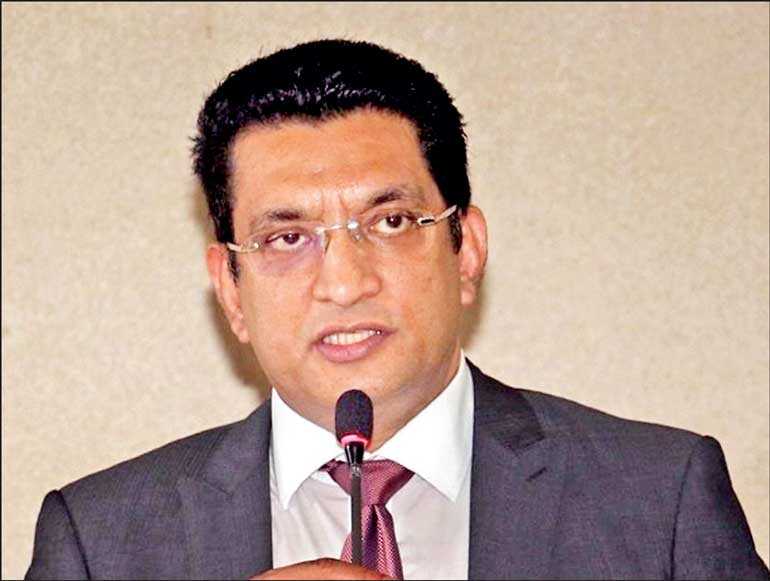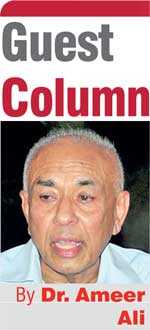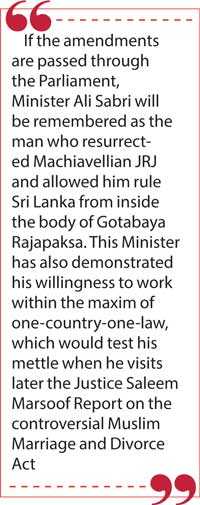Monday Feb 16, 2026
Monday Feb 16, 2026
Friday, 11 September 2020 00:00 - - {{hitsCtrl.values.hits}}

It is a strange irony that it is from the hated Muslim community that a Minister of Justice has been picked before the election, brought to the Parliament through the back door and entrusted amidst opposition with the task of amending the Constitution to empower and disempower the President and Prime Minister respectively and simultaneously, all in the name of easing the path for development
Muslims of Sri Lanka, after more than a millennium of integrated and peaceful coexistence, have become a hated, or to put it mildly, highly-suspected minority at least in the perception of ultra-Sinhala Buddhist supremacists, led by Bodu Bala Sena and a coterie such movements supported by influential  political monks.
political monks.
The ruling Rajapaksa regime that came to power with the backing of these elements has so far failed to distance itself publicly from them and allay the fears of their victims. On the contrary, the regime on several occasions has demonstrated a high degree of tolerance towards BBS’s hate campaign, while ignoring the plea for justice from affected communities.
However, it is a strange irony that it is from the hated Muslim community that a Minister of Justice has been picked before the election, brought to the Parliament through the back door and entrusted amidst opposition with the task of amending the Constitution to empower and disempower the President and Prime Minister respectively and simultaneously, all in the name of easing the path for development.
If the amendments are passed through the Parliament, Minister Ali Sabri will be remembered as the man who resurrected Machiavellian JRJ and allowed him rule Sri Lanka from inside the body of Gotabaya Rajapaksa. This Minister has also demonstrated his willingness to work within the maxim of one-country-one-law, which would test his mettle when he visits later the Justice Saleem Marsoof Report on the controversial Muslim Marriage and Divorce Act.
However, Ali Sabri is not the first and possibly may not be the last Muslim Parliamentarian to act as a prime mover of path-breaking changes in the country. Such involvement has a long history.
Long history
To start with, it was Mudliyar Sinna Lebbe, the MP from Batticaloa who, encouraged by J. R. Jayewardene, moved in 1948 the motion on the National Lion Flag. (Incidentally, Sinna Lebbe must be the only MP in Sri Lankan Parliamentary history to move a motion without addressing the House in support of it). Today, that flag has become controversial, because Sinhala-Buddhist ultra-nationalists want the flag’s orange and green stripes representing Tamil and Muslim minorities respectively, be removed to make it 100% a symbol of Sinhala-Buddhism.
Similarly, in early 1960s and 1970s it was a Muslim Minister, Badiuddin Mahmud who spearheaded the abolition of private practice for government doctors and the nationalization of education. Both measures created bitter controversies and protests from vested interests. It was also the same Minister who introduced later the infamous standardisation scheme and quota system for university entrance, which was the immediate trigger for the Tamil youth to take up arms and fight for a separate State.
Likewise, it was under a Muslim Foreign Affairs Minister, Shahul Hameed, during the Jayewardene Presidency that the Israeli Consulate, which was closed during Sirimavo Bandaranaike Government, was reopened amidst strong protest from Muslims. And now, another Muslim minister has become a willing accomplice to entrench authoritarian rule at least for the next 10 years.
How does one explain this strange phenomenon where in crucially important and controversial national issues it was not the Sinhalese but Muslim Parliamentarians who had been the prime movers?
Dilemma
In a sense, it reflects the dilemma of a middle community caught in a power struggle between two competing ethno-nationalisms, Sinhala and Tamil. Muslims of Sri Lanka have no specific ethnicity of their own. Their ethnicity is a “conundrum”, as described by a British writer in the 19th century. In fact, Muslims of Sri Lanka are of mixed origins with Arab, Malay, Persian, Sinhalese and Tamil blood.
Even linguistically, unlike the vast majority among Sinhalese and Tamils who are monolingual, a sizeable section of Muslims bilingual and many are even trilingual, although Tamil remains their mother tongue. The name Moor (Yonaka in Sinhalese and Conakar in Tamil) was acquired in desperation and out of political necessity in the 19th century. Their only identity therefore, is religious.
As a middle and numerically weak community with only a religious identity, but strategically positioned to play a decisive role during times of political contests, its leaders found it exceptionally advantageous not only to be always on the side of the winning faction, but even to act as prime movers of controversial and divisive changes and bear the brunt of blame for doing so, from the opposition. Because local Muslims are part of a huge global Islamic community, to governments in power it was equally advantageous to keep that community on their side.
This mutually-advantageous relationship has recently come under enormous pressure, especially after 2009, as Sinhala ethno-nationalism turned into Sinhala-Buddhist ethno-religious nationalism (Gehan Gunatilleke, ‘The Chronic and the Entrenched: Ethno-Religious Violence in Sri Lanka,’ International  Centre for Ethnic Studies, Colombo 2018) to which Muslim’s religious and cultural identity has become obstructionist and therefore confrontationist.
Centre for Ethnic Studies, Colombo 2018) to which Muslim’s religious and cultural identity has become obstructionist and therefore confrontationist.
The so called one-country-one-law mantra, which has still not shown its complete translation in practice, is a product of this post-2009 development. Yet, it was this mantra and the terror it injected into the minds of Muslims that led to a historic swing against the ruling party at the recent General Elections by majority of Muslim voters, even though they knew very well that SLPP would emerge victorious.
As a result, for the first time in the history of Sri Lankan Parliament a majority of Muslim Parliamentarians (17 of 20) are sitting in the Opposition. This is a new experience to them, although information is leaking that several of them are preparing to jump fence and hoping to get admitted to an enlarged cabinet of ministers and deputies, once Minister Sabri’s amendments are approved by the Parliament. Traditions die hard.
Meanwhile however, the regime’s agenda for turning the country into a Sinhala-Buddhist-Supremacist state and relegating the other faiths and communities to the periphery is gaining momentum. One-country-one-law mantra captures the essence of that vision.
Crossroad
Muslim community has reached a crossroad. True, its leaders in the past were prime movers of certain epochal changes in the country. Minister Sabri too may consider himself as one of that prestigious line of leaders in lieu of his contribution to constitutional changes. However, there is a huge difference between the past and the present.
In the previous era Muslims were accepted by the ruling regimes as partners in nation building. Therefore, Muslim leaders were happy to play the role of compradors. Today, Sinhala-Buddhist ethno-religious nationalists with whom the regime is on honeymoon consider Muslims as aliens and obstructionists to the official version of development. This was why Minister Sabri’s appointment was opposed by those nationalists. Even the President’s vistas of prosperity and splendour is tinged with this aggressive nationalism.
Given this new environment Muslim Parliamentarians have to think outside the square. The past is no guidance to the future. A wave of popular discontent against GR’s family-centred authoritarianism is bound to rise as economic situation deteriorates in view of the COVID-19 triggered global recession. Even before that, Ali Sabri’s constitutional changes are going to be challenged not only at the court of law but also along the streets. Are Muslim Parliamentarians prepared to join this protest?
(The writer is attached to the School of Business & Governance, Murdoch University, W. Australia.)